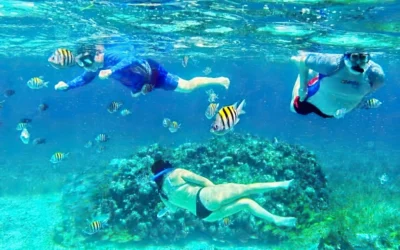- Scuba certification is mandatory (typically PADI Open Water at 15); age exceptions exist for junior courses starting as young as 10–12.
- Assess fitness and medical clearance first—scuba is strenuous; consult a doctor and do specific strength/endurance training.
- Choose a qualified instructor and course format (pool skills, open-water dives, classroom or online theory) based on comfort and location.
It is a whole new world when you venture underwater.
Does the Disney Little Mermaid song Under The Sea invoke a legitimate desire to dive beneath the water’s surface? Maybe you have snorkeled before in some translucent body of water and observed colorful coral reefs and exotic fish below. If you liked the experience of snorkeling, that is just a taste of what to expect when you scuba dive. The scuba diving experience is just about as close as you can get to being an actual mermaid, so its allure is understandable.
Certainly a more complex all around activity, scuba diving naturally incurs greater risk. To adequately prepare yourself for the adventure, it is important to do your research beforehand. If you are wondering if you actually need a scuba diving certification to dive, the answer is a resounding yes. You want to make sure you are being as safe as you can be in this process. With this in mind, the next step to procuring a “self contained underwater breathing apparatus” adventure is to obtain your certification. We have the information you need here in order to learn just how to get certified to scuba dive.
Here is all you need to know for getting a scuba diving certification.
Check if you meet the required regulations.
The only strict parameter regarding scuba diving is age limit. You must be at least 12 to begin scuba diving training. In order to obtain a PADI open water certification, that is, your scuba certification, you must be at least 15 years old. There are certain exceptions for children younger than this, but it truly varies per organization. In some cases, children as young as 10 can participate in a Junior Open Water course in order to get a head start on the scuba certification process.
Evaluate your physical condition.
Obviously scuba diving is a strenuous activity, and requires a good deal of physical strength. It is essential to examine your current state to determine if you are in the best bodily shape for scuba diving. Here are some ideal exercises designed specifically to improve the muscles you most need during that underwater adventure. If you have any pre-existing medical conditions, it is a good idea to have your doctor evaluate you before you proceed any further. Even if you are unsure whether or not you can capably scuba dive, pay a visit to the doctor just to be safe.
Locate a scuba instructor.
Once you get cleared physically, you are ready to jump right in. Well, with supervision at first, of course. You now need to find a qualified scuba instructor to teach you what you need to know in order to dive safely. This person will help you learn the basics of scuba diving so you are prepared for the certification course and test. Make sure you do your research so you know what type of teacher they are. It is important that you are free to learn in a way that most suits your personal style. Check with various outdoor gear stores or local diving centers for diving teacher listings.
Decide where to take your scuba diving certification course.
There really are endless types of scuba diving classes available. As you do your research, consider what you feel most comfortable with when learning scuba diving for the first time. This training occurs with a certified and insured scuba diving instructor supervising you. The first part of your in water training starts out simple, so don’t get intimidated just yet. You begin learning the basics of scuba diving inside a pool. This helps you get comfortable with the necessary skills, while remaining in a controlled environment. Keep in mind that the deeper the pool is, the better your real life training is going to be.
Once you learn what you need to know in the pool, it is time to take it to the next level. From here, students get to partake in their first open water dives. Depending on where you live, this is likely the ocean. However, any large body of water will do. These include rivers, quarries, sinkholes, and lakes. When selecting your scuba diving certification course, consider where you want your first open water dive to be.
Decide how to complete the theoretical portion of your scuba diving certification.
It might surprise you that not every part of becoming scuba certified takes place in the water. There is also a theoretical portion that you must ace in order to fully complete the necessary requirements. This involves studying the scuba diving manual and partaking in classes. You have the choice here whether you want to participate in online classes or sit in on a classroom session.
There are perks to either of these methods. The classroom option allows you to converse with a real live person and learn from group discussions. You can also utilize hands on application and receive real time critiques. However, if you prefer the online method, this gives you a chance to go through the material at your own pace. Additionally, this frees you up to finish the course anywhere. If you decided to complete your scuba diving class in some exotic location, you can even finish the theoretical portion online at the same time.
Plan your scuba diving adventure.
Now for the fun part. Once you obtain your scuba diving certification, you are free to participate in diving excursions around the globe. There are numerous trips available where you can travel to some of the coolest places and venture under the sea. From the islands within Southeast Asia to the famous Caribbean, there is so much waiting for you to discover. Pick up the necessary gear and a few scuba diving friends and embark on a phenomenal adventure together.
You are going to like scuba diving.
Beware: Scuba diving is addictive and should only be attempted if your schedule and wallet are prepared for the side effects. Side effects may include investing in the coolest scuba gear and fantasizing about running away to exotic destinations in pursuit of your next dive. Don’t say we didn’t warn you.
Related Article: Best Dive Watches: 6 Stellar Options for Underwater Excursions







